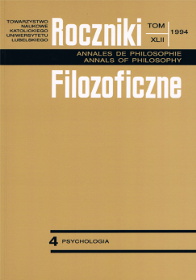Reinterpretation of the Principles of Gestalt Psychology: From the Model of the Whole as a Symbolic Figure to the Model of the Natural Whole as an Ecosystem
Abstract
The so-called neo-Gestalt orientations, which appear in cognitive psychology, draw on merely to the primary formulations of Gestalt theory of the whole. The latter was grasped in terms of the figure-ground relationship, while its main task was to define the principles of the symbolic organization of the figure as a whole separated from the background, the latter being in turn left unshaped and lacking in form. This orientation sought a “stimulus of differentiation” in the background and organization of a stable figure. This search has inspired the researchers of perception on the ground of Lewin’s principles of field psychology, Tolman’s molar psychology and the contemporary exponents of cognitive psychology. Psychologists who pursued the neo-Gestalt orientation in their study remained faithful to the associationistic and correlative approach which was decidedly critically evaluated by the proponents of Gestalt psychology.
While affirming the fact that there is a need to promote the neo-Gestalt orientation, I propose to reinterpret the popular formulations of the principles of Gestalt psychology in terms of the principles of primary holistic analysis of the wholeness of natural figures (radical Gestalt). The paper seeks to prove that these principles has systematically been redefined in the works of Max Wertheimer, K. Goldstein, A. Angyal, and J.J. Gibson. In this case we mean the principles of separating the structural and functional parts of the whole as such, and the principles of their differentiation and the way of participation in the organization of “unity in variety”. Accepting the principles of the primary analysis of wholeness enables us, among other things to redefine and put forward a model of presentation of the presuppositions of Gibson’s concept of ecological psychology. Ecosystem, taken by way of a model and a research programme which result from it, may justly be placed in the orientation of Gestalt psychology and in the still current initiators’ tendencies to work out a psychological theory of the whole. Psychology, whatever the length of its past, is yet a relatively young discipline of science. Psychologists are still searching a theory which would be a source of creative inspirations to define such a research paradigm, which in turn would make a ground for accepting a possible unity in variety among the orientations of contemporary psychology as a science.
Copyright (c) 1994 Roczniki Filozoficzne

This work is licensed under a Creative Commons Attribution-NonCommercial-NoDerivatives 4.0 International License.





